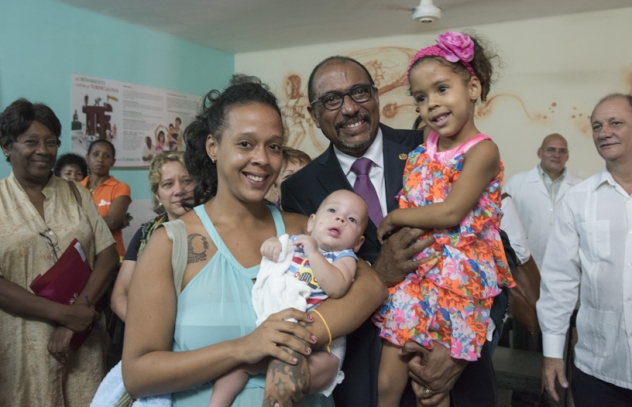A Year of Achievement for Cuban Healthcare
Morning Star | Wednesday, 30 December 2015 | Click here for original article

From Aids to Ebola, Cuba has made tremendous strides forward in 2015, writes Ollie Hopkins in the Morning Star.
THE 56TH year of the Cuban Revolution, 2015, has been a year of more inspirational achievements in health, education and internationalism — despite the ongoing US blockade.
In June, Cuba became the first country in the world to receive validation from the World Health Organisation (WHO) to successfully achieve the elimination of mother-to-child transmission of HIV and syphilis.
Given the global scale of the HIV/Aids epidemic, where an estimated 1.4 million women living with HIV become pregnant each year, the potential global health impact is phenomenal if the world can learn from Cuba.
The WHO said: “Eliminating transmission of a virus is one of the greatest public health achievements possible. Cuba’s success demonstrates that universal access and universal health coverage are feasible and indeed are the key to success, even against challenges as daunting as HIV.”
This year also saw the largest contingent of health workers who were fighting the Ebola outbreak in west Africa return home after completing their successful missions.
These world-leading achievements are from a very long list of Cuban healthcare accolades — and are a testament to the Cuban revolution and its people.
Cuba has created a world-class healthcare system and is at the forefront of biotechnology and medical research, despite being under blockade for over half a century, which prevents access to many crucial medicines and equipment.
According to the World Bank, the United States spends almost 20 times what Cuba spends per head per year ($8,553 to $431) on healthcare and yet Cuba has a lower infant mortality rate than the US and a similar life expectancy.
If the US had the same infant mortality rates as Cuba, it would save thousands of US children’s lives each year.
Cuba’s achievements clearly go beyond simple statistics and are a product of its socialist system. How society is organised, for whose benefit is public spending and the goal of a healthy, educated population all need to be considered.
The fundamental difference is that in the United States, healthcare spending funds huge profits for a wide range of companies that profiteer along the supply chain of the created health sector market.
Cuba, by contrast, has a centrally planned system where different public-sector departments work highly effectively with one another, in pursuit of the public health of its people, rather than a pursuit of profit.
Cuba’s vaccine development continues to be among the best in the world. Cimavax is a lung cancer vaccine that can suppress the growth of tumours in the lungs allowing for a stable stage of the illness, prolonging life.
The Molecular Immunology Centre of Havana, a Cuban state-owned organisation, is the creator of Cimavax and has also developed vaccines for meningitis B, hepatitis B and dengue fever. These drugs are free and universally available for patients in Cuba.
Cimavax has been available in Cuba for several years, but has gained more global attention since the US-Cuba rapprochement on December 17 last year. There has been hope for improved co-operation between the US and Cuba on health and Cimavax is now undergoing clinical trials in the US, which does signify a step in the right direction on this particular issue.
However, progress elsewhere has been limited.
Embassies opened in Washington and Havana this summer, symbolising the formal re-establishment of diplomatic relations. Despite these positive developments, the blockade is still in place, Guantanamo Bay is still occupied and US aggressive policies towards Cuba continue.
Only the United States and Israel now stand isolated in support of the blockade. Twenty-fifteen saw the largest-ever majority in the UN vote to end the blockade with a total of 191-2, with no abstentions.
The financial impact of the blockade has been devastating — $833 billion since its introduction. The blockade costs lives, and that was its intention.
Former Cuban diplomat Dr Carlos Alzugaray said at this year’s Cuban Futures conference: “One can never forget the original motives — hunger, desperation and the overthrowing of the Cuban government. They are the exact words used by the State Department in 1960.”
In October, a Cuban seven-year-old cancer patient Noemi Bernardez was denied access to Temozolomida, a drug which could radically improve her survival chances, as Cuba cannot directly purchase drugs from US manufacturers.
This is just one example from an endless list from over five decades of US aggression against Cuba, costing the health and lives of the Cuban people.
As part of the post-December 17 relations, President Barack Obama has authorised limited trade. But the devil is in the detail — only US companies are allowed to supply certain goods to privately owned properties or enterprises in Cuba. Cuba still cannot export to the US.
The US strategy of exclusive private-sector trade is a deliberate attempt to undermine the Cuban government and its social achievements, including free universal healthcare.
The US Treasury guidelines give examples such as not permitting US companies to provide air-conditioning to Cuban hospitals because they are publicly owned.
The methods have changed but the objective remains the same. US interference in Cuba clearly continues, with regime change being the goal and to roll back the achievements of the revolution.
Another year of revolution has continued to improve the lives of Cubans and the wider world — from Ebola sufferers in west Africa to post-earthquake Nepal, Cuban internationalism continues to direct resources to where they are needed.
Cuba continues to be an inspiration for those who strive for a better world and international solidarity with Cuba is crucial in the struggle to end the blockade. Ending the blockade could unleash Cuba’s vast potential and help improve and save yet more lives across the world.
Ollie Hopkins is campaigns officer for the Cuba Solidarity Campaign






